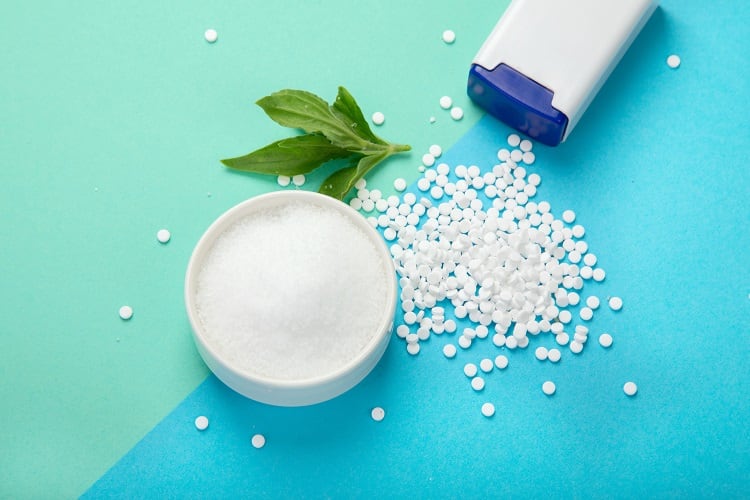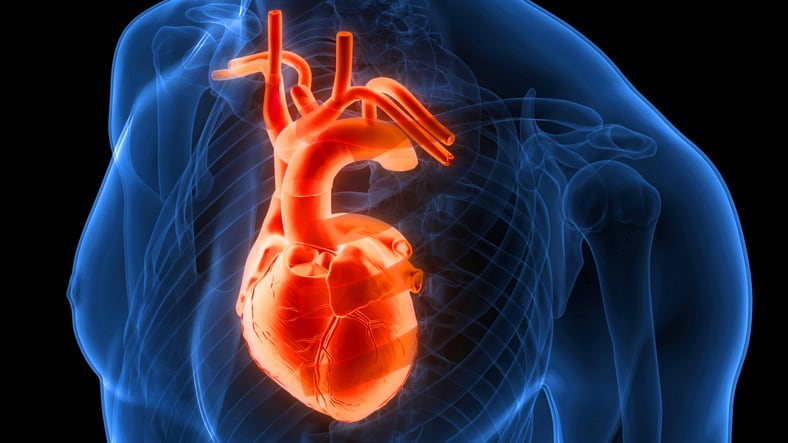It’s been a big couple of years for artificial sweeteners as researchers focus efforts on one of the big questions in nutrition: are non-sugar sweeteners healthier than sugar?
In a new strike against artificial sweeteners (and not the first), researchers in the UK have discovered that neotame can damage the human intestine and cause illness.
Neotame could lead to IBS
Neotame, otherwise known as E 961, is chemically related to – and made from – aspartame. Although a relatively new sweetener on the global market, neotame can be found in drinks, sauces, and savoury and sweet foods.
To date, researchers haven’t known a lot about its impact on gut health. But in a new study published in Frontiers in Nutrition, research led by Anglia Ruskin University found that neotame can damage the intestinal epithelium – which forms part of the gut wall.
“Our findings are the first to demonstrate that neotame can damage the intestinal epithelium directly, through the sweet taste receptor T1R3, and indirectly through stimulating pathogenic changes in model gut bacteria which are closely associated with the epithelium,” noted the study authors.
In simpler terms, neotame can directly cause the death of epithelial cells, and indirectly damage bacteria commonly found in the gut. This kind of damage could lead to health issues such as irritable bowel syndrome and sepsis.
Findings build on previous research
The research builds on earlier findings linking artificial sweeteners saccharin, sucralose, and aspartame to gut damage.
“There is now growing awareness of the health of sweeteners such as saccharin, sucralose and aspartame, with our own previous work demonstrating the problems they can cause to the wall of the intestine and the damage to the ‘good bacteria’ which form in our gut,” explained Anglia Ruskin University’s Dr Havovi Chichger.
“This can lead to a range of potential health issues including diarrhoea, intestinal inflammation, and even infections such as septicaemia if the bacteria were to enter the blood stream.
“Therefore, it is important to also study sweeteners that have been introduced more recently and our new research demonstrates that neotame causes similar problems, including gut bacteria becoming diseased.”
The Calorie Control Council, which represents the low- and reduced-calorie food and beverage industry, takes issue with the study's link to humans health - since the researchers used lab-controlled models. "Further, considering the small amount needed to achieve the desired level of sweetness in food and beverage products, people are unlikely to consume levels of neotame that would affect the gut microbiome," we were told.
Weighing up non-sugar sweeteners
The finding is not the first against artificial sweeteners in recent times. Last year, the World Health Organization (WHO) advised against using non-sugar sweeteners to control weight. The recommendation came after researchers were unable to find a link between sweetener use and long-term body fat reduction in either adults or kids.
A couple of months later, the WHO classed aspartame as ‘possibly carcinogenic’ – but safe to consume within daily intake guidelines.
In better news for the non-sugar sweetener category, just last month researchers found that neotame consumption does not increase appetite, and actually reduces blood sugar levels.
These findings prompted researchers to back the day-to-day use of sweeteners for body weight and blood sugar control. “Simply restricting sugar from foods without substitution may negatively impact its taste or increase sugar cravings, resulting in difficulties sticking to a low-sugar diet,” said lead author Dr Catherine Gibbons from Leeds University at the time.
“Replacing sugars with sweeteners and sweetness enhancers in food products is one of the most widely used dietary and food manufacturing strategies to reduce sugar intake and improve the nutritional profile of commercial foods and beverages.”
Source: Frontiers in Nutrition
‘The artificial sweetener neotame negatively regulates the intestinal epithelium directly through T1R3-signaling and indirectly through pathogenic changes to model gut bacteria’
Published 24 April 2024
DOI: https://doi.org/10.3389/fnut.2024.1366409
Authors: Aparna Shil, Luisa Maria Ladeira Faria, Caray Anne Walker, and Havovi Chichger.





